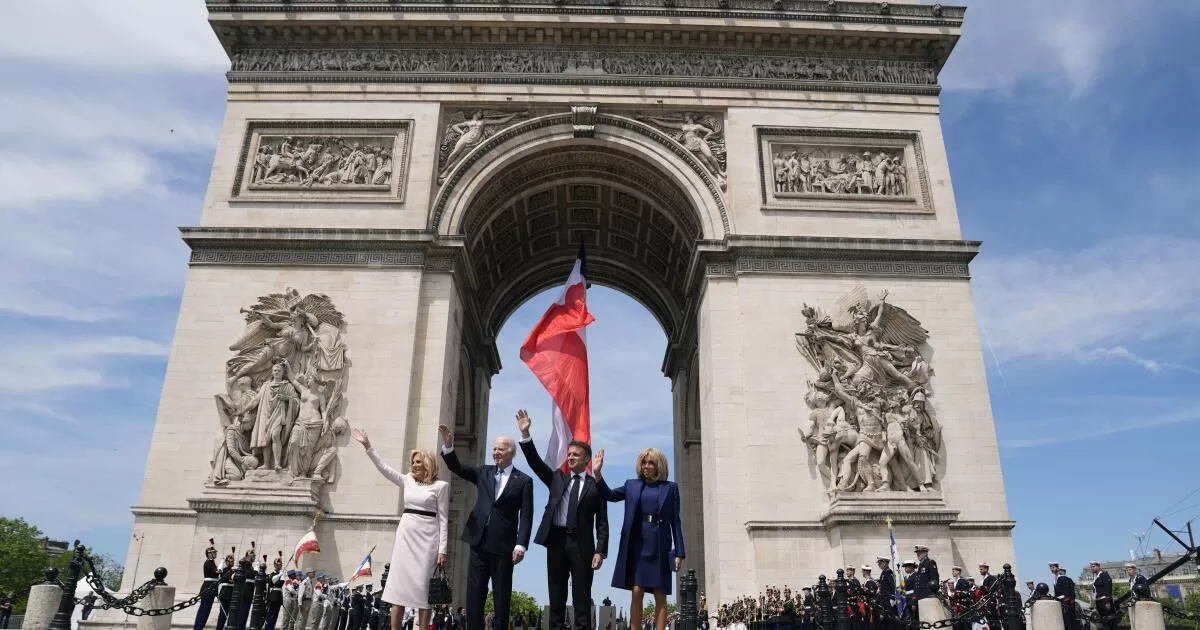Biden and Macron attended ceremonies marking the 80th anniversary of D-day on Thursday and met separately the following day with Ukrainian President Volodymyr Zelensky in Paris. The leaders both used those engagements to underscore the urgent need to support Kyiv’s fight against Russia’s invasion.
But Macron and Biden have often chafed at the pace of support for Ukraine, especially as the United States, by far the largest contributor to Kyiv’s defense, was forced to pause aid shipments for months while congressional Republicans held up an assistance package.
The state visit began with a ceremony at the Arc de Triomphe, including a wreath-laying at France’s tomb of the unknown soldier, and a military parade along the Champs-Élysées leading to the Élysée Palace, where the two held official meetings and were delivering public statements. Later, there is a state dinner at the palace for Biden and his wife, Jill.
“Proud to be here,” Biden said at the Arc de Triomphe. “A great honor.”
Biden hosted Macron in December 2022 at the White House for the first state visit of his presidency as the COVID-19 pandemic receded.
First Lady Jill Biden flew back to Paris aboard a U.S. government plane after spending Friday in Delaware to support their son, Hunter Biden, who is standing trial on federal gun charges.
As the president’s trip draws to a close, the far right is likely to emerge as one of the biggest winners in Sunday’s European Parliament election while Macron’s pro-European Union movement is flagging.
A top French official said Macron and Biden have a friendly and warm relationship and stressed that the U.S. president is spending five days in France, reflecting the importance he attaches to the visit. The official spoke anonymously, in line with customary practices for Macron’s office.
The official said the U.S. presidential campaign was not a factor in the discussion.
Macron hosted then-President Trump, the presumptive Republican nominee this year, for Bastille Day in 2017, and he came to Washington for a state visit in 2018 before their relationship soured.
U.S. and French officials said Ukraine would be at the top of Saturday’s agenda, but the centerpiece of the weekend event would be the strength of the alliance, fortified at Normandy 80 years ago, but with roots far deeper.
“It’s probably a good thing for us to remember that we didn’t win our independence either without some foreign help or foreign assistance, specifically from France,” White House national security spokesman John Kirby said Friday.
Max Bergmann, a former U.S. State Department official who leads Europe research at the Center for Strategic and International Studies, said the U.S.-French relationship is strong despite occasional disagreements.
“There’s always tension in Franco-American relations because the French try to do stuff,” he said. “They’re bold, they throw up proposals, and that leads to some friction when we push back.”
For example, he said, France proposed putting Western trainers on the ground in Ukraine, leading to questions of whether this is “really giving Ukraine a major, tangible benefit” or has the “potential to be escalatory and dangerous.”
Regarding Macron, Bergmann said, “he’s the one that pushes the boundaries and throws up ideas.”
Kirby said the two leaders would have an announcement Saturday on deepening maritime law enforcement cooperation in the Indo-Pacific region. They also were to discuss economic and climate challenges.
While praising the Biden administration’s commitment to supporting Ukraine, Macron said earlier this year that Europe must become “capable of defending its interests, with its allies by our side whenever they are willing, and alone if necessary,” arguing the continent should rely less on the U.S. for its own defense.
He also warned Western powers against showing any signs of weakness to Russia as he repeatedly said that sending Western troops into Ukraine to shore up its defense should not be ruled out.
The leaders were also set to discuss their efforts to bring about a cease-fire to the Israel-Hamas war in Gaza, as the U.S. and Israel await Hamas’ response to a Biden-promoted cease-fire proposal that would allow a surge of humanitarian assistance into the territory.
Macron is expected to raise U.S. trade practices that he has often criticized, including the Inflation Reduction Act, which favors American-made climate technology such as electric vehicles. Macron said the U.S., like China, has “decided not to respect the rules of global trade” by shoring up protections and subsidies while Europe’s industry remains open and is stuck in overregulation.
The French official said Europe has to defend European interests, after watching the U.S. do the same with its own, but said Macron hopes to find a mutually acceptable outcome.
As the pair met outside the palace, Biden appeared to suggest to his host that the U.S. and Europe could “coordinate together,” and he was heard telling Macron about his most recent conversation with Chinese President Xi Jinping, who was objecting to steep U.S. tariffs on Chinese electric vehicles.
Gary Hufbauer, nonresident senior fellow at the Peterson Institute for International Economics, said trade with China is a sticking point between the U.S. and Europe, particularly France. The U.S. has been more eager to restrict trade, particularly regarding technology.
Biden is also moving toward tariffs on Chinese electric vehicles and batteries, which could affect European cars that include Chinese parts.
Overall, Hufbauer said, “Europe wants to maintain much more trade with China than the U.S. wants.”
Megerian, Miller and Corbet write for the Associated Press.
